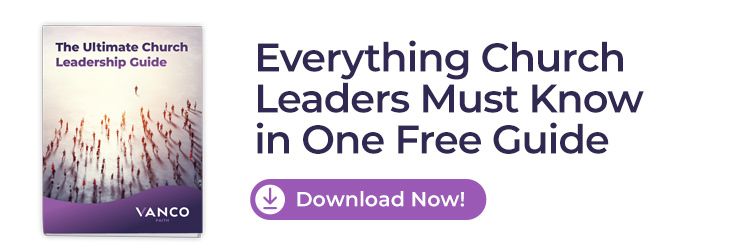
The best people to fill church leadership roles and responsibilities aren't faint-hearted. A church leader should be a Godly role model and a guide for your church members and everyone else in the community. They mentor and encourage people, furthering their faith and ensuring they have a positive church experience, while playing a central role in starting a ministry.
They can also partake in church leadership training, which can help expand their leadership role and responsibilities. A 2024 study found that churches with a lack of viable leadership training can struggle to find competent leaders with the skills needed to help their church thrive.
Church leaders should help their church become a warm and welcoming community. Good church leadership will help retain members and promote revitalization. Keep reading to learn 12 church leadership roles and responsibilities to enhance your ministry.
Too Busy to Read? Listen to the Key Takeaways
Get the key takeaways by clicking to listen the podcast summary now!
The Importance of Good Church Leadership
A church cannot thrive without good leadership. That seems like a blanket statement, but let's look at how vital effective church leadership really is.
A case study published on Mark Woodward's blog demonstrated a situation where a family was dissatisfied with their church and wanted to leave. The elder board held an open meeting demonstrating a personal approach.
During the meeting, the leaders showed a sense of unity and humility. They asserted their roles as shepherds guiding the flock. Though it's unclear whether they convinced the family to stay, they showed the importance of keeping their church family together.
Further statistics show an increasing distrust of church leaders and pastors in particular. A UMF study reveals that only 39% of Americans have a high regard for pastors in terms of honesty and ethics. Rather than discourage pastors, these statistics should inspire them to be transparent and communicate regularly with their congregation.
It also means churches that hire qualified, trustworthy leaders can stand out in their communities.
Key Church Leadership Roles and Responsibilities to Support Senior Pastors
Churches cannot operate under the silo of senior pastoral leadership. Those that thrive often operate a ministry team led by the pastor, similar to the structure of a corporation.
Pastor responsibilities in church are similar to a CEO's, as their leadership team oversees the various departments within the organization. The board of deacons often serves as the board of directors, overseeing governance and management.
Without church leadership structure, the pastor would oversee all church operations. As a result, they may become overwhelmed and ineffective. There is also the risk that their leadership may become too powerful and unbalanced.
Churches, like any other organization, must have checks and balances to ensure well-organized and effective operations. They must fill key ministry leadership positions with qualified individuals who share the pastor's vision and are true believers.
1. Associate Minister
A senior pastor can appoint one or many associate ministers. These roles are typically unpaid unless the individual is hired as part of the church's administrative staff in another capacity.
Associate ministers are men and women who are aspiring to become senior pastors. They have received some level of training and may have already undergone ordination. Ordained ministers can carry the title of associate pastor.
Some individuals see their role as on-the-job training. They can provide support by filling in for the pastor, speaking during his absence. Duties of church leaders in associate minister roles can also include administering communion to the sick and shut-in and presiding over funerals for non-members.
2. Executive Minister of Administration
The executive minister of administration can be likened to a corporate vice president role. The person serving in this capacity in church administration is second in command and will take the helm during the pastor's absence. They also oversee the church staff and are closely connected to the elder board.
A pastor is best suited for these church leadership roles and responsibilities because they are qualified to sit in for the senior pastor. They also have ministry experience, as well as business and leadership training, to guide their staff members.
Having an executive minister of administration has many benefits. For example, this church leader frees up the pastor's time, allowing them to attend community meetings and advocate for church funding and other resources. It also provides more oversight to the church staff.
3. Minister of Finance
 Church leadership roles and responsibilities include handling large sums of cash. Although churches carry tax-exempt status, they still require a Minister of Finance to oversee their finances.
Church leadership roles and responsibilities include handling large sums of cash. Although churches carry tax-exempt status, they still require a Minister of Finance to oversee their finances.
The Minister of Finance can be in a paid or unpaid position, depending on the responsibilities of the person in the position, which may include the following:
- Budgeting and Financial Planning: The church leader will develop a church budget and determine financial priorities.
- Financial Reporting: The Minister of Finance will provide financial reporting to church members and other stakeholders to promote transparency. They will also handle all tax needs.
- Responsible Stewardship: They will ensure the use of church funds aligns with the organization's goals and ethics.
- Safeguard Church Assets: The church leader will determine the best ways to handle church assets such as cash and property.
The Minister of Finance may have lesser or greater responsibilities depending on church size. Large churches may choose to hire a Certified Public Accountant (CPA) for this position.
A larger church may also appoint a Minister of Finance to oversee finance teams, including:
- Accounting departments
- Bookstore staff
- Special events staff
- The Board of Trustees
4. Minister of Education

The minister of education oversees the education portion of a church's various education ministries, such as:
- New members courses
- Sunday School curriculum
- Vacation Bible School
- Ministry training courses
This church leader will play a pivotal role in the youth ministry curriculum. They may also have input if the church has a daycare or private school.
The qualifications for biblical church leadership in this capacity should include formal training or experience in education. This person must also have the ability to oversee Christian education for toddlers to seniors.
5. Minister of Music and Performing Arts
One of the most revered church leadership roles and responsibilities in the contemporary church is the minister of music. If a church has an outstanding choir and performing arts ministry, it becomes a magnet for younger generations, families with children and anyone passionate about the arts.
The minister of music's church leadership role and responsibilities include recruiting members to sing in various church choirs. These choirs can include:
- Mass choirs
- Senior choir
- Young adult choir
- Men's choir
- Children's choir
The minister of music conducts choir rehearsals, hires musicians, secures copyrights for recorded music performances and approves community performances. This ministry leader also works with the church's school and daycare, if applicable.
Many modern churches also have performing arts ministries. These ministries encompass the following:
- Theatrical performances
- Liturgical dancers
- Mime performers
- Church choir competitions
Ministers of music are typically salaried positions with benefits.
6. Executive Leader of Ministries

Contemporary churches have various ministries. The bigger the congregation, the more ministries a church can offer.
For this reason, a church can have numerous non-traditional ministries that operate in an unorthodox manner.
Executive leaders of church ministries oversee each ministry and ensure they are operating within the church governance models, which may include the following bylaws:
- A term limit on how long someone can serve in a leadership capacity
- Guidance on roles and worship leader duties
- The procedures for creating and dissolving ministries
- Requirements for membership
- Conflict resolution
- The accountability of each ministry member and leader
- The transition of ministry leaders between roles
In addition to regulating church governance, ministry leaders may:
- Develop a schedule of events
- Work with the ministry of finance to develop a ministry budget
- Assist with evangelism
Ministry leaders require strong church leadership principles and business acumen skills. The individual must be organized and work well under pressure. Look for these qualifications to ensure your ministry leader guides your church to success.
7. Youth Pastor

Youth pastors are paid church employees. Their pastor responsibilities in church are similar to those of a church's senior pastor, overseeing various church departments. However, they focus on the youth department, which has separate sanctuaries and facilities on the church campus.
Youth pastors should relate well with youth. They are often millennials who bring new ideas and concepts to attract youth to the church. The reduced age gap helps them engage youth with technology and pop culture, creatively promoting Christian learning.
They have the task of creating programs for youth, designing a youth-friendly atmosphere and choosing volunteers. Depending on the size of the church, the youth & children's ministry may have an administrative assistant and other church leadership roles similar to the main church. The youth pastor must oversee these staff members. They may also have a say in the youth ministry budget.
Churches understand that the youth will become the future of the church. The youth pastor plays an integral role in fostering these long-term relationships.
8. Director of Youth Services
The director of youth services serves under the youth pastor. Their church leadership roles and responsibilities are in line with the executive leader of ministries and include the following tasks:
- Ensuring youth ministries follow church bylaws
- Assisting with events and recruitment
- Helping with financial planning
- Serving as a liaison for the youth pastor and working closely with their administrative assistant
- Helping develop youth activities
- Attracting community engagement to support youth activities
- Helping organize youth retreats and mission work
Like a youth pastor, the director of youth services must be energetic and enjoy working with youth. They must understand their importance in helping them form lifelong relationships with the church.
9. Minister of Outreach

The minister of outreach looks for opportunities for the church to serve the community. The goal is to reach the unchurched through unique discipleship ideas.
The person in this role must have strong communication skills, compassion and the ability to organize events with church volunteers. They develop outreach ideas and play an instrumental role in their execution.
Most outreach opportunities are service-based. Examples include:
- Neighborhood cleanups
- Home repair for the elderly
- Food and clothing drives
- After-school tutoring
- Baby supplies
- Career counseling
- Clothes closets
- Drug addiction support groups
- Financial planning
- Prisoner re-entry programs
- School supply drives
- Single-parent support groups
The minister of outreach may also partner with community-based organizations who use the church as an extension of their services. For example, they may sponsor Boy and Girl Scout troops or partner with non-profits on food drives, HIV testing and social services festivals.
10. Director of Evangelism Ministries
Evangelism ministries are the heartbeat of the church. The bible tells us to go out and minister to the lost and downtrodden. The director of the evangelism ministry understands the importance of going into the community and knocking on doors to breed discipleship.
This individual must have compassion and the willingness to go the extra mile for others. They have exceptional knowledge of Bible scriptures and community resources. The Evangelism ministry must have a good working rapport with various ministries because their church roles and responsibilities may overlap.
The role of the director of evangelism ministries may include the following:
- Working in conjunction with the director of outreach to determine the best way to engage the community
- Recruiting volunteers who will help with evangelism and evangelical events
- Working with the prison system to recruit volunteers and support them on their journey
11. Director of Media and Communications

The media ministry has become an integral part of church ministry in the digital era. At the height of the COVID-19 pandemic, many churches would have closed their doors permanently if it were not for their media ministry.
The director of media ministry is in charge of this branch. Their church leadership roles and responsibilities require a strong working knowledge of digital marketing. The director should also have photography and videography skills and a knowledge of copyright laws and rules for photographing and recording in commercial spaces.
The responsibilities of the director of media ministry include:
- Covering church-related events for live streaming purposes
- Handling the church's social media accounts
- Overseeing all aspects of the church's digital media, including websites, paid ads and emails and ensuring optimal visibility
12. Director of Security
More than any other time in history, churches today are cognizant of the dangers that lurk within the church. Following violent incidents in churches across the country, security ministries have grown in popularity.
The director of security is often someone with a law enforcement background. This person can be a full-time staff member or volunteer.
Their church roles include providing security details for the senior pastor while on the church campus and traveling to special events. They also ensure church services are secure, particularly during the offering.
Often, church security teams consist of off-duty law enforcement and trained security guards. Most are licensed to carry concealed weapons.
Final Thoughts
A church is only as strong as its leaders. Churches must identify the various church leadership roles and responsibilities and find the best people to fill these roles. With the proper approach, they will develop a staff that supports growth and provides spiritual oversight within the community.
FAQs
How many elders/deacons should a church have?
There is no fixed number or ratio that sets the standards for how many elder or deacon roles a church should have. It depends on your church's size and the needs of your congregation. For example, large churches with various ministries may need several elders and deacons, while smaller churches with fewer ministries may require just a few.
What's the difference between a board and a council?
Boards and councils are different types of leadership structures. Church board responsibilities typically focus on strategic planning, financial oversight and long-term vision, while a church council structure oversees operations, plans, ministries and daily management. They often work together to ensure seamless functionality.
How do we ensure our leadership team remains accountable?
Leadership teams remain accountable through a system of checks and balances. No leader should have the authority to make major decisions without consulting other leaders and staff members. Leaders should also be required to provide stakeholders with finance reports and conduct regular meetings to ensure everyone is on board with current operations.
Get Everything Church Leaders Must Know in One Free Guide
Get the tested church leadership strategies and techniques used by top ministries to build healthy and growing congregations. Download our free eBook to learn…













